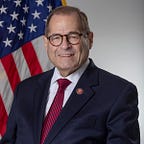Statement on Boycott, Divestment and Sanctions (BDS) Campaign at Barnard College
I am dismayed to hear that the Boycott Divestment and Sanctions (BDS) movement has once against reared its head at Columbia University. As a Columbia College (Class of 1969) alum, whose son is also a graduate, I care deeply about the well-being of the school and the campus community. I first became involved with progressive politics as a Columbia student activist protesting the Vietnam War, and since 1992 I have proudly represented the Congressional District within which Columbia is located.
Two years ago, a similar effort to advance a BDS agenda at Columbia was launched, and because of my strong affinity for the school and its students, as well as my deep concerns about the BDS movement, I felt compelled to comment at the time. This year, despite the multiple failed attempts to secure endorsements of BDS from Columbia student leaders and administrators, the small pro-BDS student constituency on campus has convinced Barnard College’s Student Government Association to initiate a referendum for Barnard’s student body to vote on whether the university should divest from a set of companies engaged in business with Israel.
I feel that it is once again important to offer my support to the students fighting to defeat this divisive and wrong-headed measure, and sincerely hope that in doing so they are able to educate the Columbia community about the true nature of the BDS movement. As I have stated previously, the global BDS movement, despite deceptively presenting itself as both progressive and pro-peace, in reality advances neither of these principles.
The tactics used by the BDS movement do not reflect progressive values, and often smack eerily and hypocritically of fascism. Its proponents advocate for a complete boycott of Israeli businesses and institutions, ironically seeking to deny Israelis and their commercial and academic partners the same rights and freedoms that BDS supporters often claim they themselves are denied. BDS leaders denounce and actively prevent partnerships between Israelis and Palestinians. The BDS movement supports a full boycott of Israeli scholars and academic institutions, directly undermining the ability of these largely progressive intellectuals and activists to work at the core of the pro-peace movement in Israel advocating for the rights of Palestinians by blocking their interactions with like-minded individuals around the world.
Here in the U.S., pressure from BDS leaders has led to pro-Israel activists being barred from participating in the pro-LGBT Dyke March in Chicago and other liberal coalitions that have emerged since the 2016 election. And especially troubling is the movement’s deliberate hijacking of the political discourse on college campuses across North America. Universities have traditionally served as the training ground for the sophisticated and nuanced exchange of ideas. Supporters of BDS here in North America have refused to engage in dialogue with pro-Israel, pro-peace, pro-academic freedom student leaders and academics. By suppressing dialogue and advancing its biased narrative, BDS has engendered polarizing and incendiary environments on hundreds of campuses — an especially dangerous development in a time when our political leaders so frequently employ divisive and hateful rhetoric.
BDS’s aggressive actions — at times invoking anti-Semitic tropes and seeming to promote violence — have marginalized pro-Israel students and threatened Jewish life on many campuses. At Columbia, for instance, members of the pro-BDS coalition put together an informational event entitled “I for Intifada.” While supposedly focused on acts of civil disobedience, the organizers failed to acknowledge that the recent Palestinian intifada in the early 2000s involved the deliberate killing and injuring of unarmed Israeli civilians. Further disturbing is the fact that BDS leaders in the U.S. recently spearheaded a national speaking tour headlined by Rasmea Odeh, a Palestinian terrorist convicted in the murder of two innocent Israelis. These inflammatory tactics deserve no place on our college campuses and undermine the kind of respectful and balanced engagement desperately needed to bring about understanding between the two sides.
Equally important, BDS’s one-sided approach only exacerbates prospects for an Israeli-Palestinian agreement and is a disservice to the cause of peace and stability. The BDS movement unfairly blames one party, and does nothing to encourage the two sides to return to direct negotiations, which is the only path to a lasting resolution. Essential to the BDS platform is a “full Palestinian right of return,” which is code for a one-state solution that would bring about Israel’s end. As such, BDS runs contrary to the only realistic and just outcome to the conflict embraced by the entire international community — the two-state solution — allowing both parties to actualize their right of self-determination. Instead of promoting peace, the mission of BDS is clear: to delegitimize Israel and deny the Jewish people a state of their own.
I can, of course, sympathize with the frustrations of progressive activists who, like me, want to see faster progress towards a peaceful resolution of the Israeli-Palestinian conflict. But smart, nuanced, effective work in solidarity with peace-seeking Israelis and Palestinians aiming to end this conflict and bring about a two-state solution must mean a rejection of misguided and deceptive approaches like BDS that do not further the cause of peace or progressive values. For students at Columbia and Barnard, productive alternatives to BDS do, in fact, exist on campus, and I wholeheartedly endorse the efforts of students who have organized an “Invest in Peace” campaign supporting joint Israeli-Palestinian ventures.
I applaud the student leaders working to counter this divisive and misleading BDS campaign in an intelligent and respectful way. I am encouraged to see that the full spectrum of the pro-Israel community on campus, including J Street and AIPAC aligned students, along with other allies have joined the “Barnard United — Vote No and Reject BDS” campaign.
And I am hopeful that, like the majority of votes that have preceded it on other U.S. campuses, this BDS referendum will be roundly defeated.
